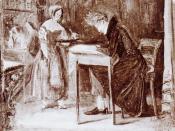Søren Kierkegaard and Friedrich Nietzsche are considered by most to be the grandfathers of existentialist thought. While they had many ideas in common, such as the errors of all previous philosophers, they differed on thoughts concerning knowledge. Kierkegaard believed that knowledge could only be communicated to the audience indirectly, and through that the individual must make his own choice as to which possibility he will accept and make his own subjective truth. Nietzsche, on the other hand, believed that knowledge is a direct representation of the individual's will to power, and the only way to exercise this will to power is to recognize the fact that opposites do not exist in terms of value judgments. After close textual analysis it becomes clear that Nietzsche's view of knowledge is the correct one, for in it he explains his concept of will to power and how everyone, including Kierkegaard himself, conforms to it.
For Kierkegaard, knowledge can be looked at from two perspectives, objectively and subjectively. An objective view of knowledge is concerned with what is said, whereas a subjective view of knowledge focuses on how it is said. Kierkegaard believed that philosophers of the past were concerned with using objective truth as the path for knowledge (Kierkegaard, 305). These objective truths are passed on to the public as absolutes, so that they have no need for a quest for knowledge. Everything they need to know has already been determined for them. However, these truths have no basis in reality, for they are merely the constructs of one person's mind. They exist only as possibilities for the individual, out of which an individual actuality is chosen. Kierkegaard believes that true knowledge lies in the subjective, for "whereas objective thinking invests everything in the result and assists all humankind to cheat by copying...


